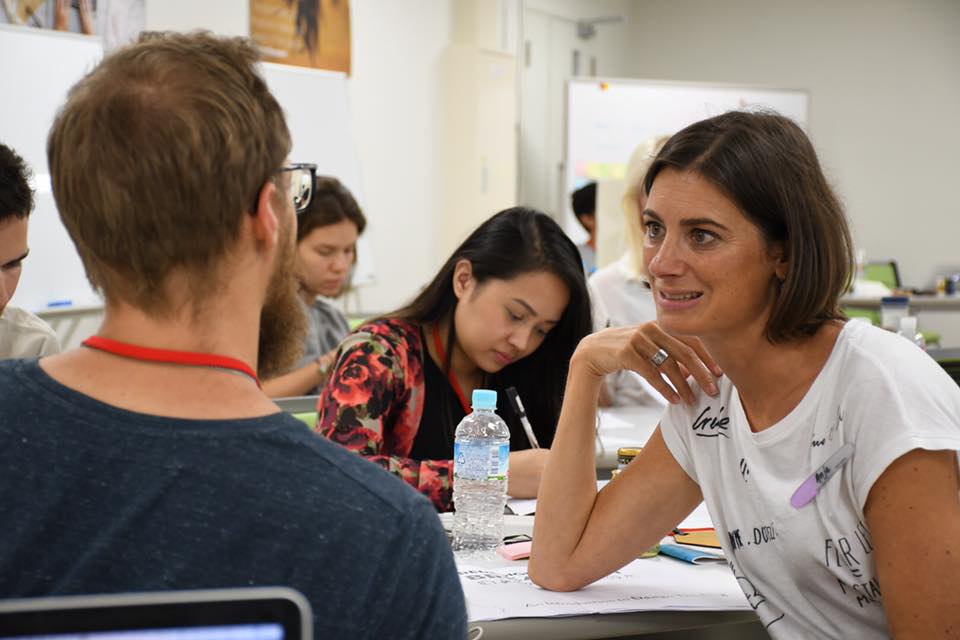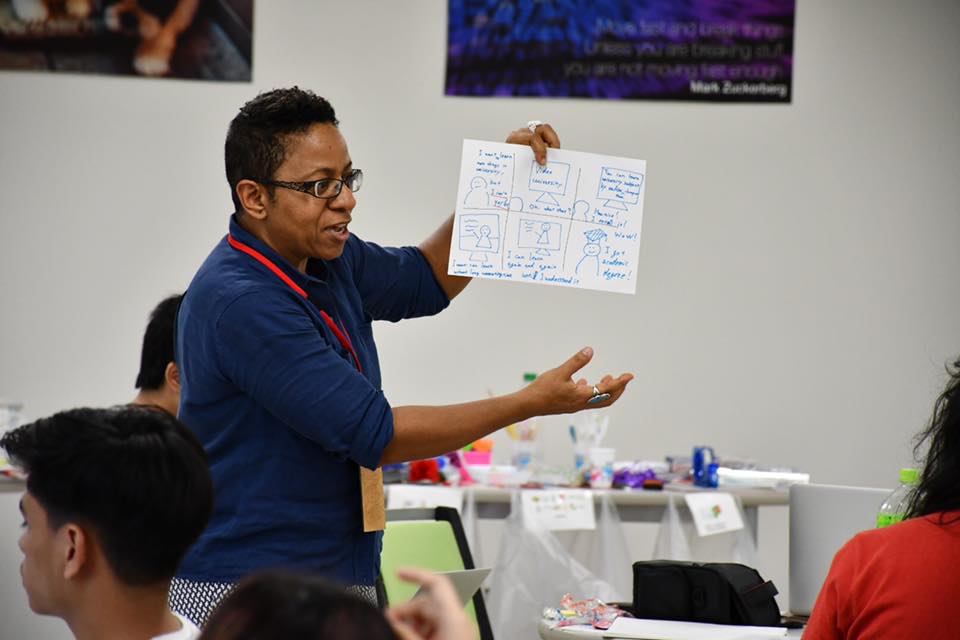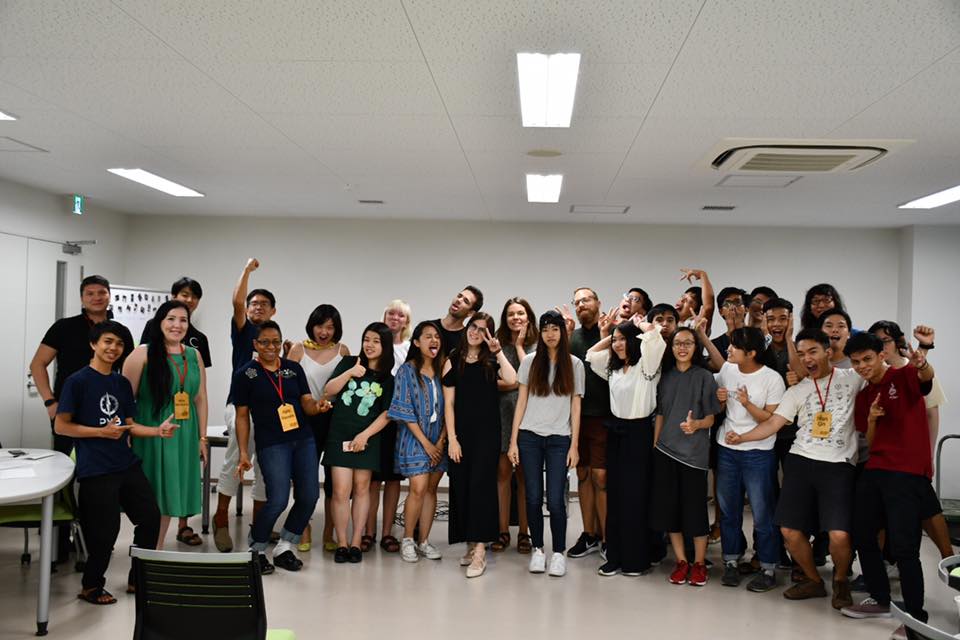世界20カ国から参加者が集まる、起業家育成プログラム『Kyoto Startup Summer School(KS3)』が2017年8月21日から始まっています。3週間に渡るプログラムを通じて、スタートアップの世界で現在進行で起きている理論・手法・テクノロジーを一気に吸収する短期集中型のワークショップです。今回は、「デザイン思考」と「リーンスタートアップ」を実践的に学んだ、1週間目のプログラムと活動をご紹介します。
第2回の様子はこちらから:
[レポート]Kyoto Startup Summer School (KS3) Week 2-3:多数のイントロダクションが充実したレクチャー+ワークショップ
ワークショップを中心としたWeek1の講師は、スタンフォード大学d.schoolなどで「デザイン思考」を教えるAnja Nabergojさんと、デザインリサーチャーとしてスタートアップを支援するAjay Revelsさんです。

Anjaさんはプログラム全体の初日から担当するため、参加者たちの緊張をほぐし、活発な交流が生まれるように「アイスブレイク」から始まります。専門も所属も、国籍も文化も異なる参加者たちの思いや興味が徐々に見えてくると、強張っていた参加者の顔に笑顔と自信が見えてきました。参加者間の人となりがなんとなく掴み始めてからは、ようやく「デザイン思考」のワークショップが始まりました。与えられたテーマは、「訪日外国人観光客の滞在体験を向上させるプロダクトやサービス」です。「それでは、日本にどれだけの外国人観光客が来ているのか調べてみましょう!(パソコンカタカタ」とならないのがこのワークショップ。Anjaさんからは、「観光客がどのような滞在をしているのか、彼らの物語を聞いてきて下さい。」という指示が出ます。30代女性・韓国人などといった統計的な属性ではなく、「なぜ・どこで・いつ・なにを」のヒアリング調査を通じて、物語からの洞察を集めていきます。参加者は物語と洞察を元に「ロールプレイ」、つまり演劇によるアイデアの発表を行います。言葉が使えないシーンや独特のサインに困惑する様子が毎回出るので、「日本に来た外国人あるある」に参加者たちは笑いっぱなし。調査で見えてきた課題や可能性を演劇を通じて、参加者に共感させる発表はとても新鮮でした。

続いて、後半のAjayさんのワークショップでは、前半で得られたアイデアの種を育てていく2グループと、スタートアップチームが検討しているアイデアを考える5グループに別れて検討が行われます。参加者らはビジネスの全体構造を一枚のシートに書き出す「ビジネスモデル・キャンバス」を用いて、短期間にアイデアの可能性を議論していきます。Ajayさんからは各要素にどのようなブレイクスルーがあればアイデアの発展を成し遂げられるのか、と各グループへ質問を投げかけていきます。国内外で競合他社はどのような展開を行っており、自分たちはどのような差別化を図るのかなどなど、かなり具体的な質問がなされます。それらを踏まえてその場で「ペーパープロトタイピング」に着手し、発展したアイデアの検証や発表を行います。3日という短い時間のなかで、熱量の高い授業でした。
1週間という短い期間の中で参加者らは、スタートアップさながらにものすごく早いスピードで決断が求められます。とにかく手を動かしながら色んな方向へ発展をしていくグループもあれば、頭を抱えているグループも見られるのが面白いところです。バックグラウンドの違いを認識しながらも共感できることを見つけたり、イラストなどの別言語を駆使しながら検討していくことが求められているのかもしれません。実社会さながら、とても刺激的な1週間となったようです。

次週では、エンジニアリングからマーケティング・資金調達までの幅広い講義とワークショップが日替わりで続きます。さらに脳みその回転を高めていきながら、参加者らは最終日のデモデイに向けてたくさんのインプットとアウトプットを繰り返していきます。
9月8日に開催される公開展示 デモデイは、どなたでも自由に参加することができます。日本で多数のスタートアップを投資するアレン・マイナー氏を基調講演にお招きし、スタートアップのこれからをお伺いいたします。日本で始めてとなるプロダクトやサービスの数々を直接観にいらして下さい。
関連リンク:
・Kyoto Startup Summer School
・Kyoto Startup Summer School (KS3) Week 2-3:多数のイントロダクションが充実したレクチャー+ワークショップ
–
Kyoto Startup Summer School 2017 デモデイ
日 時: 2017年9月8日[金] 18:00-21:00(開場 17:45)
会 場: 京都工芸繊維大学 60周年記念ホール
ウェブ: http://www.kyotostartupschool.org/
主 催: 京都工芸繊維大学 KYOTO Design Lab
–
ライター紹介: 浅野 翔
1987年生まれ。2011年、京都工芸繊維大学造形工学課程 建築コース卒業。2014年、同大学大学院デザイン経営工学専攻 環境デザイン経営コース修了。同年よりデザインリサーチャー、サービスデザイナーとして活動を始め、2017年よりKYOTO Design Labのパブリケーション・マネージャーを務める。
On August 21st of 2017, Kyoto Startup Summer School (KS3) has officially kicked off by welcoming young aspiring entrepreneurs from 20 different countries. KS3 is an intensive 3-week program that teaches the latest design methodology, theory and technology observed in the current world of startup. In this article, we introduce the first week of KS3 where participants focused on the hands-on learning of Design Thinking and Lean Startup.

This workshop-oriented week is led by Anja Nabergoj, who teaches Design Thinking at d.school of Stanford University, as well as Ajay Revels who supports startups as a design researcher.
As a very first lecturer of KS3, Anja has engaged the participants in various ice-breaker activities that vitalize their interactions amongst each other. Once they get to know those with different specialization, nationality and cultural background, the nervous look on their faces was immediately replaced by smiles radiating with confidence. Once they are comfortable with each other, Design Thinking workshop has finally begun. The challenge given by Anja is to create a product or service that improves the traveling experience of foreign tourists in Japan. But the instruction that follows is much more than opening a laptop and google the number of foreign tourists in Japan. KS3 is better than that. Anja, instead, instructs the participants to go out and listen to the travel stories told by foreign tourists themselves. Meaning, the focus here is to refrain from a mere statistical research, and instead, conduct a 5W1H interview that delves into the subjective stories of the target users. Then, the participants were instructed to use the insights gained from the interviews and give a role-play presentation that communicates a startup idea. Many of the presentations turned out to be received with laughter for they depicted a very typical and relatable scene of confused foreigners struggling to overcome the language barrier and communicate with the Japanese. All in all, it was absolutely refreshing to see this approach of guiding the participants to empathize with the target users’ problems and potentials through role-playing.

The latter half of the week featured Ajay’s workshop where the participants separated into two types of groups: one that develops the ideas gained from Anja’s workshop and another that helps develop startup teams’ ideas. Using a strategic management template called Business Model Canvas, the participants quickly visualized the whole structure of their startup and discussed the potential of each idea they had in mind. Ajay, then, encouraged each of the groups to consider what breakthrough is needed to develop their idea even further. Here, she also focuses on turning their abstract idea into a more concrete one by asking them how to differentiate themselves from their competitors. Using the insights gained from this brainstorming session, each group immediately took on paper prototyping in order to test and present their developed idea. After all, it turned out to be a very intense three-day session.
Within a short time frame of one week, the participants were required to make decisions very quickly just as a startup would be. It was interesting to see how some groups try to work swiftly and make progress into various directions while some other groups get stuck thinking deeply. In a multi-cultural group, it is perhaps helpful to accommodate new approaches such as to use sketching as a common language or to find something one can empathize with about another person while recognizing the obvious differences. All in all, the experiences of this week seemed to excite and stimulate the participants, just as the real world would.

The second week of KS3 features lectures and workshops that cover a variety of topics such as engineering, marketing and fundraising. The participants will boost their brain power and go through various inputs and outputs in order to get ready for the Demo Day.
Demo Day that will be held on September 8th is open to everyone. Mr. Allen Miner, who invests in many startups in Japan, will give us a keynote speech about the future of startup scene. Please come visit to witness the products and services disclosed for the first time in Japan on Demo Day.
Kyoto Startup Summer School 2017 Demo Day
Date: September 8, 2017. 18:00-21:00 (Door opens at 17:45)
Location: 60th Anniversary Hall, Kyoto Institute of Technology
Web: http://www.kyotostartupschool.org/
Host: Kyoto Institute of Technology, KYOTO Design Lab
Related links
・Kyoto Startup Summer School
・[Report] Kyoto Startup Summer School (KS3) Week 2-3
Writer: Kakeru Asano
Kakeru Asano was born in 1987, Japan and spent his youth in Nagoya city. He took a master degree in design, engineering and management from Kyoto Institute of Technology in 2014. He has worked as a design researcher and service designer based in Nagoya since 2014, and he jumped into KYOTO Design Lab in 2017 as a publication manager.